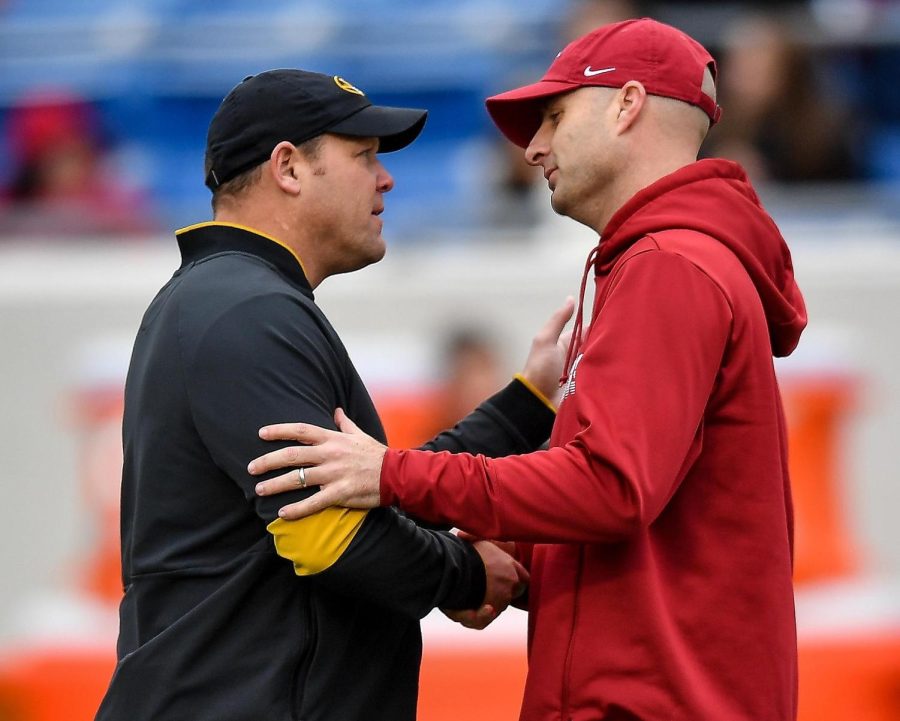New Illinois football offensive coordinator Barry Lunney Jr. brings new vision, style to Champaign
Photo courtesy of Jimmy Jones/TNS
Coach Barry Lunney Jr. speaks with Missouri coach Barry Odom at the Battle Line Rivalry game on Nov. 29, 2019. Lunney will be taking over as the new offensive coordinator for the Illini.
Jan 16, 2022
With offensive coordinator Tony Petersen out, Illinois head coach Bret Bielema has landed on a new offensive coordinator: Barry Lunney Jr.
Lunney was the OC for UTSA last season, a team with a potent offense the Illini got to witness firsthand when they lost to them, 37-30, at home on Sept. 4.
Lunney is a familiar face to Bielema, who originally brought him on as his tight ends coach at Arkansas in 2013. Bielema eventually intended on promoting him to OC himself but was let go before he had the opportunity to do so.
“Once I was with Coach Lunney (at Arkansas), I believe it was maybe year two or three, we actually divided our special teams up,” Bielema said. “We didn’t have a 10th coach, so we made every coach have a special teams assignment. The reason I did that was I thought it maximized our staff, but I also like to watch coaches that aren’t coordinators at the time learn how they can run the room.
“So, I put Barry in charge of our punt team, and it was something he had never done. … I did it for two reasons: I thought it’d be great for the room, but also I wanted to watch and see and learn (about) him as a potential coordinator. If I had stayed at Arkansas, I knew eventually I would have transitioned (to Lunney) offensively.”
Get The Daily Illini in your inbox!
Since Bielema’s exit from Arkansas, Lunney continued as the tight ends coach before taking on the interim head coach title for a few games in 2019. After that season, he jumped to UTSA as an offensive coordinator, leading one of the nation’s most potent offenses.
For some perspective, UTSA ranked 11th nationally in points per game at 36.9 last season. Meanwhile, Illinois struggled as one of the worst offenses in the Big Ten with an average of 20.2 points per game.
“Obviously the last two years at UTSA, I’ve seen what he’s been able to do as an offensive coordinator,” Bielema said. “He took that program to new levels of success. I saw it firsthand as a competitor and witnessed it overall. As I decided to make the transition, I began to look at different offensive coaches, different offensive styles, different programs, and I just kept gravitating back to coach Lunney at UTSA.
“Conversations I began to have with him and even with their head coach talked about what Barry was able to do to install, to implement, to put in his own verbiage and language.”
As far as that verbiage goes, Lunney coined the term “tempro,” a combination of tempo and pro-style, to describe the way he plays offense. Lunney emphasized his desire for the offense to play to its strengths rather than strictly imposing his UTSA playbook.
Bielema reinforced Lunney’s focus on malleability with the offense, noting the Roadrunners’ ability to change up their offense to be run- or pass-dominant depending on the opponent each week. That level of adaptability is something he hopes to bring to Illinois with Lunney.
“Even though I’m talking about building to our strengths and playing to our strengths, … I think (there’s) one thing that’s not going to change,” Lunney said. “One thing that we’re not going to waver on is the identity of physicality and toughness that’s required to win in college football. It might be different than what was done here in the past. Maybe a little bit different from what we did at Arkansas. What’s not going to waver is the identity that we’re trying to establish of running the football.”
While Lunney is riding high now as the offensive coordinator of a sizable college football program, that wasn’t always the case for him. Prior to joining Bielema’s staff at Arkansas, Lunney was a high school offensive coordinator and middle school gym teacher.
“My first year (teaching), I’m going from play-caller, co-offensive coordinator for San Jose State, to now part of my assignments at Bentonville was coaching and teaching seventh grade PE,” Lunney said. “And I really had to make a decision professionally. Here’s what I (decided): If I was going to do this, I was going to do it right. If I was going to do it, I was going to try to be the best educator and teacher that I could be, so I really tried to jump into that world and learn.”
Lunney cited his foray into education as helping him teach players as a coach. One thing he pointed to was his understanding that everyone learns differently and that he may need to coach auditory learners differently than visual ones.
“I brought him in because I knew him personally and what he’s capable of teaching; that’s why I made the move,” Bielema said. “I think he’s an incredible teacher. He coached in high school football, so he’s literally had to walk the walk of being a teacher and an instructor. That’s very important to me. A lot of people can talk. Very few people can teach. I think he’s an excellent teacher which gets me excited.”
@WesHollenberg






